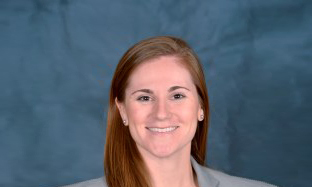Almost a decade ago, Marra Hvozdovic was an Atlantic Coast Conference “futures” intern, assisting in the planning and administration of 21 ACC Olympic Sport Championships, preparing supplemental material for conference sport committee meetings, and revising all Olympic Sport regular season policy and procedure guides and championship manuals.
The experience was a harbinger of things to come. In 2016, she would join the ACC destined to become its director of compliance. Hvozdovic has gone on to also become very active in the National Association of Athletics Compliance, serving as its Communications Committee chair. For those reasons and many others, we sought out Hvozdovic for an interview.
Question: You were a former softball player at Virginia Tech, how did your experience as a student athlete prepare you for a career in compliance?
Answer: My personal experience shapes my perspective on the value of the college student-athlete experience. I recognize that sport at the collegiate level provides student-athletes with access to higher education and a natural setting to develop their leadership abilities. For me, pursuing a career in compliance feels like the perfect blend – combining my interest in the college student-athlete experience and my skillset (analytical, creative, detail-oriented).
Q: Were there any mentors during your career and how did they impact you?
A: Too many to name! I feel fortunate to have a strong mentorship circle, all of whom have helped in various ways throughout my career. My mentors are often included in major personal and professional decisions, as I trust they will give me thoughtful and honest advice. Also, my participation in the National Association for Athletic Compliance’s (NAAC) ACE Mentorship Program helped me intentionally expand my mentorship relationships.
Q: What are some of the differences between compliance at the conference level versus the school level?
A: As a campus compliance administrator my interactions were most often with sport coaches, student-athletes, and other university administrators. My role was to support their success by ensuring the athletic department appropriately applied NCAA rules, in particular, I was responsible for rules education, interpretation, monitoring and enforcement for a specific bylaw area (i.e., recruiting). My role as a conference administrator puts me in more regular contact with compliance administrators from all levels (i.e., campus, conference, national office). It is my priority to provide thoughtful, analytical, and solution-focused rule interpretations to our member schools. And, when necessary, identify trends and other issues that may be alerted across our membership and/or with the NCAA Staff.
Q: What are the most challenging NCAA rules to enforce and why?
A: Anything related to recruiting. It is my observation that this area of NCAA rules is where most try to gain their competitive advantage. Experience has taught me that NCAA rule interpretations can be more subjective than I originally thought. That said, there are still clear guidelines and boundaries we should be mindful of.
Q: What is the best part of your job?
A: Good compliance administrators consider themselves problem solvers. What I love about my job is that we have the opportunity to be solution-focused when using NCAA rules to our advantage. I honestly believe NCAA compliance is a main contributor to the success of an athletic department.
Q: What is the most challenging aspect of it?
A: Navigating the complexities of NCAA rules can be challenging. In most cases, compliance professionals are asked to think across bylaws or subject areas, so a diverse perspective is beneficial. At the end of the day, it is more important that we find a solution that is grounded in the legislative intent and supports the principles of the NCAA. I believe that decision-making approach can help you feel confident in the outcome.
Q: What advice would you give someone interested in a career in the NCAA compliance field?
A: Of course, someone interested in a career in college athletics likely played sports or is passionate about athletic competition. That said, a NCAA compliance administrator is expected to represent their school or conference with integrity and objectivity, even if it is at the detriment to the immediate situation. My advice would be to channel your inner sports fandom, consider what it takes to be an ethical decision-maker, and develop skills that will support you in difficult conversations.


